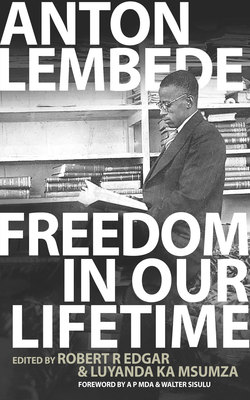Читать книгу Freedom in Our Lifetime - Anton Lembede - Страница 6
На сайте Литреса книга снята с продажи.
ОглавлениеForeword
WALTER SISULU
I knew Anton Muziwakhe Lembede for only four years before his tragic and untimely death. But those four years were his most productive and significant – they were the years for which he is chiefly remembered.
From the first time when he came into my offices in Diagonal Street in 1943, Lembede struck me not only as a keen intellectual, but a philosopher and theoretician. He had an ability to examine ideas from any quarter, no matter how much he might disagree with those who initiated them. He examined with rational interest, for example, the strategies used by Afrikaner nationalists to mobilise and uplift their poor – in those days there were many thousands of unskilled, jobless newcomers from the platteland. Lembede felt that Africans could learn from their successes. And from the communists, who he firmly rejected both as a Catholic and an Africanist, he learnt to respect a militancy based on political theory (as opposed to the hamba kahle [go well] approach of the older ANC leaders). Lembede also reaffirmed the value of socialism as expressed in the precolonial African communal tradition.
It was Lembede, together with A P Mda and Nelson Mandela who sat up late at night drafting the political philosophy for an as-yet-unborn Youth League, before presenting the document to colleagues such as Willie Nkomo, Lionel Majombozi, Oliver Tambo and myself, to consider and to critique. But of course Lembede, as a typical leader of the Youth League, fought the struggle not only politically, but with all the impressive skills at his disposal.
I remember clearly his practical support, as an articled clerk, together with Nelson Mandela, then a law student, in advising James Mpanza, head of the Sofasonke squatter movement, on how to challenge the Johannesburg Municipality on legal grounds to provide housing for the workers in the city. When the government wanted to deport Mpanza, Lembede together with Mandela, went to Pretoria to meet the Secretary of Native Affairs to argue the case against Mpanza’s deportation.
It is not necessary to detail any further Lembede’s passionate nationalism, his deeply spiritual nature and his earnest commitment to enhancing and promoting a mass-based African National Congress – these are well captured by Lembede’s own words in this book.
Fifty years after the founding of the Youth League, the message of Lembede, its first elected president, remains clear: that it is the youth who have the capacity to renew the struggle, which today continues in a new form. It is the critical gaze of the youth who play the time-honoured role of re-examining the status quo, sometimes to the discomfort of the “old guard”. It is they who have always had the capacity and the energy to renew and reinvigorate the ANC so that its grassroots members could continue to play their rightful part in democratising our society. And, just as in Lembede’s generation, the youth also have the flexibility to scrutinise their own positions, and have the courage to adapt them to changing conditions if need be. These are important lessons to examine in the context of Lembede’s time, and to reconsider in the light of today’s historic moment.
The editors of this book are to be congratulated for a timely and thoughtful tribute to an exceptional young man, for he played a key role in a turning point in the history of the ANC. This volume should be seen as a challenge to readers to collect the memories of others who participated in the struggle, who fought to take control of their lives and to mobilise others to do the same. The record of our political struggle still has a long way to go before present and future generations can fully appreciate and understand our past. Lembede’s life is but one example of the remarkable courage and dedication that the forces of oppression and exploitation evoked in our people – old and young, men and women, black and white – to deepen and enhance the quality of the lives of all South Africans, in the time-honoured tradition of the ANC.
